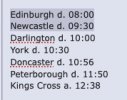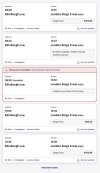Bletchleyite
Veteran Member
There are quite a few where they don't, but I'm not about to name them here. It's fair to say the vast majority of XC-set SVRs have that restriction, but it's not universal by any stretch of the imagination. Many of their most popular flows are also not priced by them (e.g. journeys within the West Midlands or around Yorkshire) so the restrictions are necessarily different.
That's fair. Perhaps "near-standardised" is a better way of putting it.
However what XC have actually done is a bit moot, it was just an example. If LNER wanted to make Super Off Peak simple they could just put very simple restrictions on it - "between 0930 and 1600, then from 1900 until close of service" is very easy to remember. Rather than the mess 9D actually contains (notably it *does* contain "not before 0930" for XC!)
So (and this is the real point) it's false of LNER to say that Super Off Peak is necessarily complicated.


